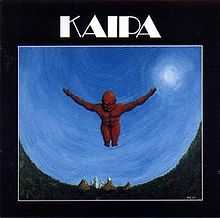Kaipa (album)
| Kaipa | ||||
|---|---|---|---|---|
 | ||||
| Studio album by Kaipa | ||||
| Released | 1975 | |||
| Recorded | February, July 1975 | |||
| Genre | Progressive rock, Symphonic rock | |||
| Length | 47:55 | |||
| Label | Decca | |||
| Kaipa chronology | ||||
| ||||
Kaipa is the first album by Swedish Progressive rock band Kaipa, released in 1975, two years after the band formed.
In order to promote themselves, the band decided to contact record companies. The group then sent a demo tape to record labels MNW and Silence, from both of whom the group received a negative response, and then to a friend called Leif Mases, who worked at Marcus Music Studios. Leif played the tape to Markus Österdahl, the studio’s owner and he was reportedly pleased with it and immediately offered the group the chance to record a professional demo onto a 24 track studio. The tracks "Karavan", "Från det ena till det andra" and "Skogspromenad" were recorded on 3, 5, and 6 February 1975, and the last track was later included.
Marcus had a friend called Carl-Eric Hjelm from the Electra label, a Swedish record company who distributed Decca, RCA and Philips nationally, and played him the tape. Charmed by the music, Hjelm asked the band to record him an album, preferring to await the results before signing them officially. Eventually, Decca would sign Kaipa and issue the album.
The recording session was completed in nine days between 4 and 26 July 1975 at Marcus Music Studios in Stockholm, with Marcus himself acting as the engineer. According to the band's official website, Ingemar, Roine and Tomas didn’t want to include the song “Skogspromenad” on the album, because they thought it was too simple and not representative of the band. Marcus considered this to be one of their best songs, and in the end it was included on the album. At one point, the track became the band’s most requested song for a long time. Hans used a large array of keyboards, including Hammond organ, Fender Rhodes electric piano, synthesizer, string ensemble and harpsichord as well as handling vocals. The band produced the album themselves and without much studio experience. They were sometimes unable to reproduce their own characteristic sound to their satisfaction, particularly in the more experimental sequences that sounded inferior to stage renditions.
Nevertheless, it is said that Kaipa’s originality shown right from the album and in general the group was satisfied with the final result. A painting by Roine, depicting “an astral traveller floating freely above temples in the jungle”, was chosen as the artwork for the front cover.
Kaipa performed subsequently at different open-air festivals in the summer of 1975 and embarked on a short tour in the autumn which included more radio broadcasts. The album was released in December 1975 to an enthusiastic public and critical response. Sales quickly reached 5,000 units, finally reaching 10,000, a definite success for a self-produced prog rock album, especially as distribution was limited to Scandinavia. By that point, Kaipa became one of the leading Scandinavian progressive rock groups.
Personnel
- Ingemar Bergman: Drums, Percussion & Backing Vocals
- Tomas Eriksson: Bass & Backing Vocals
- Hans Lundin: Hammond Organ, Fender Rhodes Electric Piano, Grand Piano, Yamaha SY1 Synthesizer, Harpsichord, Logan String-Machine, Glockenspiel & Lead Vocal
- Roine Stolt: Electric and Acoustic Guitars & Backing Vocals
- Marcus Österdahl: Engineer
Track listing
Recorded at "Marcus Music Studios" Stockholm, Sweden, July 1975
- "Musiken Är Ljuset (English: The Music Is The Light)" (Hans Lundin, Roine Stolt) – 7:04
- "Saker Har Två Sidor (English: Things Have Two Sides)" (Hans Lundin) – 4:34
- "Ankaret (English: The Anchor)" (Hans Lundin) – 8:40
- "Skogspromenad (English: Forest Walk)" (Hans Lundin) – 3:40
- "Allting Har En Början (English: Everything Has A Beginning)" (Hans Lundin) – 3:12
- "Se Var Morgon Gry (English: Look Where Morning Dawns)" (Hans Lundin) – 8:53
- "Förlorad i Istanbul (English: Lost in Istanbul) " (Roine Stolt) – 2:24
- "Oceaner Föder Liv (English: Oceans Give Birth To Life) " (Roine Stolt) – 9:28
Bonus Tracks Included On "The Decca Years"
Recorded at "Marcus Music Studios" Stockholm, Sweden, February 1975
- 9. "Från Det Ena Till Det Andra (English: From One To Another)" (Roine Stolt) - 2:49
- 10. "Karavan (English: Caravan)" (Roine Stolt) - 2:54